- NONFICTION BOOKS
- BEST NONFICTION 2023
- BEST NONFICTION 2024
- Historical Biographies
- The Best Memoirs and Autobiographies
- Philosophical Biographies
- World War 2
- World History
- American History
- British History
- Chinese History
- Russian History
- Ancient History (up to c. 500 AD)
- Medieval History
- Military History
- Art History
- Travel Books
- Ancient Philosophy
- Contemporary Philosophy
- Ethics & Moral Philosophy
- Great Philosophers
- Social & Political Philosophy
- Classical Studies
- New Science Books
- Maths & Statistics
- Popular Science
- Physics Books
- Climate Change Books
- How to Write
- English Grammar & Usage
- Books for Learning Languages
- Linguistics
- Political Ideologies
- Foreign Policy & International Relations
- American Politics
- British Politics
- Religious History Books
- Mental Health
- Neuroscience
- Child Psychology
- Film & Cinema
- Opera & Classical Music
- Behavioural Economics
- Development Economics
- Economic History
- Financial Crisis
- World Economies
- Investing Books
- Artificial Intelligence/AI Books
- Data Science Books
- Sex & Sexuality
- Death & Dying
- Food & Cooking
- Sports, Games & Hobbies
- FICTION BOOKS
- BEST NOVELS 2024
- BEST FICTION 2023
- New Literary Fiction
- World Literature
- Literary Criticism
- Literary Figures
- Classic English Literature
- American Literature
- Comics & Graphic Novels
- Fairy Tales & Mythology
- Historical Fiction
- Crime Novels
- Science Fiction
- Short Stories
- South Africa
- United States
- Arctic & Antarctica
- Afghanistan
- Myanmar (Formerly Burma)
- Netherlands
- Kids Recommend Books for Kids
- High School Teachers Recommendations
- Prizewinning Kids' Books
- Popular Series Books for Kids
- BEST BOOKS FOR KIDS (ALL AGES)
- Books for Toddlers and Babies
- Books for Preschoolers
- Books for Kids Age 6-8
- Books for Kids Age 9-12
- Books for Teens and Young Adults
- THE BEST SCIENCE BOOKS FOR KIDS
- BEST KIDS' BOOKS OF 2024
- BEST BOOKS FOR TEENS OF 2024
- Best Audiobooks for Kids
- Environment
- Best Books for Teens of 2024
- Best Kids' Books of 2024
- Mystery & Crime
- Travel Writing
- New History Books
- New Historical Fiction
- New Biography
- New Memoirs
- New World Literature
- New Economics Books
- New Climate Books
- New Math Books
- New Philosophy Books
- New Psychology Books
- New Physics Books
- THE BEST AUDIOBOOKS
- Actors Read Great Books
- Books Narrated by Their Authors
- Best Audiobook Thrillers
- Best History Audiobooks
- Nobel Literature Prize
- Booker Prize (fiction)
- Baillie Gifford Prize (nonfiction)
- Financial Times (nonfiction)
- Wolfson Prize (history)
- Royal Society (science)
- NBCC Awards (biography & memoir)
- Pushkin House Prize (Russia)
- Walter Scott Prize (historical fiction)
- Arthur C Clarke Prize (sci fi)
- The Hugos (sci fi & fantasy)
- Audie Awards (audiobooks)
- Wilbur Smith Prize (adventure)
Make Your Own List

Nonfiction Books » History Books » Historical Figures
The best books on hitler, recommended by michael burleigh.

WINNER 2001 Baillie Gifford Prize for nonfiction
The Third Reich: A New History by Michael Burleigh
Hitler has a reputation as the incarnation of evil. But, as British historian Michael Burleigh points out in selecting the best books on the German dictator, Hitler was a bizarre and strangely empty character who never did a proper day's work in his life, as well as a raving fantasist on to whom Germans were able to project their longings.
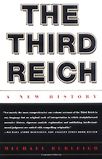
The Fuehrer by Konrad Heiden
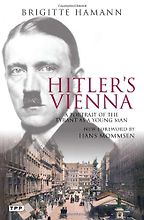
Hitler’s Vienna by Brigitte Hamann
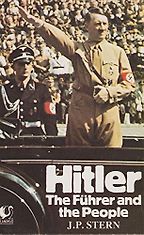
Hitler: The Fuhrer and the People by J P Stern
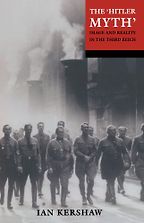
The Hitler Myth by Ian Kershaw
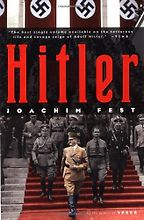
Hitler by Joachim Fest
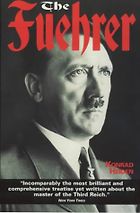
1 The Fuehrer by Konrad Heiden
2 hitler’s vienna by brigitte hamann, 3 hitler: the fuhrer and the people by j p stern, 4 the hitler myth by ian kershaw, 5 hitler by joachim fest.
L et’s start with the first of the Hitler books you’ve chosen, The Fuehrer . The author, Konrad Heiden, was a journalist?
So when you say he got on his case, you mean he got on it in a negative way – he wasn’t a supporter?
He certainly wasn’t a supporter. Rather than an academic writing about it, he did what any good journalist would do and started to look into Hitler’s finances and his relationships with women and all that sort of stuff. He delved. He got down to the grubby detail.
And what was the grubby detail?
Well, things like the fact that Hitler was living with his niece and she shot herself in the 20s under odd circumstances. Presumably his intentions or his controlling nature became too onerous. It took some guts to write about that, given that these Nazis were armed and violent people. Money was coming in from all sorts of covert directions with secret donations from businessmen. It’s a better book than all the ponderous tomes on Hitler, because Heiden was actually there – it’s of the time. I think that can be more interesting than people who write about things afterwards.
Did Heiden know Hitler?
Tell me about the next of your Hitler books, Hitler’s Vienna by Brigitte Hamann.
Brigitte Hamann was a contemporary Austrian academic who went to great lengths to study his life. It’s quite tricky because Hitler provided his own account in Mein Kampf , which includes an account of his childhood and his time in both Vienna and Munich before and after WWI , so you appear to know. She used an incredible amount of legwork to separate the reality from the mythology. He constructed his whole life, his odyssey, as a form of political mythology.
“He was somebody who never did a day’s work in his life and loafed around, going on a downward trajectory and lived in doss houses before WWI.”
What does the book say Hitler lied about?
Well, for example, he says he conceived his hatred of Jews when he arrived in Vienna from his home town. The reality was that he was selling his painted picture postcards to Jewish commercial art dealers, who were selling them for him. In the book he says that the people he particularly detests are the eastern Jews from Poland, Orthodox Jews, many of whom were living in Vienna. But there he is having actually quite normal relations with Jewish picture dealers.
You’re surely not trying to suggest that actually Hitler didn’t hate Jews?
No, no! I’m not saying that. I’m saying it’s a bit more complicated. He stereotypes them by saying they’re wandering about the streets in their beards reeking of garlic, but actually most Jews in Vienna were highly assimilated and he was dealing with them.
What else does Hamann dig out about Hitler in the book?
Just his bizarre lifestyle, really. He was somebody who never did a day’s work in his life and loafed around, going on a downward trajectory and lived in doss houses before WWI. He didn’t go to Germany until shortly before the war. Ironically, he was Austrian and didn’t become a German citizen until 1932… Did you know that?
I knew he was Austrian .
But he didn’t get citizenship until 1932, which means that, given his political agitations in the 1920s, he could quite legitimately have been deported if anybody had been minded to deport him. He was trying to avoid serving in the Austro-Hungarian armed forces. He got his papers and fled to Germany.
But why was he in doss houses? He was from a respectable family, wasn’t he?
Well, it’s more complicated than that. It was quite an extended family with a lot of changes of names and peculiarities. He just didn’t have any money, he didn’t work – and there was no social security net, so he went down.
How did he creep up again?
By going to Germany. He claimed that Austria-Hungary was a kind of multi-cultural mishmash that he wouldn’t have wanted to fight for anyway. Whereas, of course, Germany was a different proposition because he was an ultra-German nationalist, so he served as a runner in the WWI on the Western Front.
And lied about that too?
Well, he did get decorated for bravery. One author said the real men in the trenches at the front would have been vaguely contemptuous of him, running backwards and forwards between the command posts where he got given the written orders to take up to the front for the officers to execute. I find that a bit of a spurious distinction though. I mean, there would have been bullets flying around and shells, whether you were a runner or not. I think on one occasion one of the command bunkers he was running for was obliterated by a shell, killing everybody in it.
Are we going to be able to be sympathetic towards him then? Maybe he had post-traumatic shock which manifested itself in…dictatorial madness?
Well, a lot of people had post-traumatic shock and went on to leave unexceptional lives in the post-war period. He was gassed and blinded, which he again dramatises, waking up blinded and gassed and facing Germany’s unconditional surrender. It’s very bizarre – you can see what they were on about in the sense that German armies were way into Eastern Europe on one front and right out in France and Belgium on the other and they hadn’t actually been militarily defeated. They would have been crushed to pieces if it had gone on any longer, but if you were a German soldier you’d have found it all quite mysterious. Of course, Hitler then blamed it on internal subversion.
The book’s title makes it sound like a guidebook to Hitler’s Vienna. Is there an element of that?
Tell me about J P Stern, the author of the third of your Hitler books, Hitler: the Fuehrer and the People .
He was a literary scholar who applied much more attention to matters of language , looking at the rhetorical concepts that someone like Hitler was using. So everything gets reduced to these militaristic concepts of struggle and battle. Really, it’s about the way in which someone like that successfully turns his own quite odd life story into the story of a country. All political extremists do this. You convert your individual grudge or grievance into a bigger narrative. That would be true of Islamist radicals in this country right now, as well as Nazis. Someone like Hitler successfully made his own life story emblematic.
It’s incredibly interesting from a psychoanalytic perspective. Everybody tries to make the outside world match their inner world and if your inner world is very disturbed… Hitler was actually creating an outside world to match his inner one.
Yes, exactly. He was making himself into an animated version of the unknown soldier on the war memorial. He was the ordinary person who came back to articulate the alleged views of the people killed in their millions in the First World War.
He’s also enacting a massive omnipotent fantasy.
Yes, on the largest scale. J P Stern is very well placed to talk about his, as he knows about language, probably from reading Karl Kraus , the great inter-war satirist who also wrote very astute things on all this. Hitler’s speeches have very particular patterns in them. It’s essentially the redemptive story – there we are down in this abyss and I’m going to lead you out of it.
Watching them as someone who doesn’t speak German, he doesn’t look like a great orator. He looks like a complete psychopath, shouting and waving his arms.
No, no! I don’t think that at all! I’ve listened to lots of his speeches, including things like opening a motorway or something, and you’d be surprised at the level of economic analysis, and then, of course, there are these moments when he just goes off on a completely wild tangent, whenever he touches upon the subject of Jews. Like all anti-Semites.
“ The Hitler Myth is about how grannies would knit socks for him, about the whole interaction with the German people”
Supposing you and I were having lunch and one of us looked down at the salt cellar and said: ‘It’s a well-known fact that the Jews monopolised the Medieval salt trade in the South of France.’ That’s what he would be like and that would lead on to some other aspect of their perfidy.
What did Jews mean to him, do you think?
That’s an incredibly complicated subject. In a way there’s a type of contempt and hatred with a sneaking admiration for their biological pertinacity. That they survive everything. It’s a love-hate relationship, though with a great deal less love, obviously. What I mean is that he would have thought they maintain their racial integrity, which he admires.
So, there’s a sense of belonging that he doesn’t have.
Yes. And it’s a very complicated relationship. If you go to Israel the Polish Jews always talk about the snobbery of German Jews, who are the most cultured and sophisticated. The most German, basically. Ironically, they were assimilated and non-religious so that their point of identification was with German culture.
So you do think he was a great and charismatic orator?
Of course. He must have been. It’s also the way in which he offers a transgressive temptation. In other words he is inviting you to think dark thoughts. He’s articulating dark thoughts people had in their heads anyway and giving them voice.
Like a racist joke? It’s OK if it’s a joke?
A bit like that, yes. He’s tempting people to think things and go along with things he’s articulating. The whole thing was set up and he would deliberately hold the speeches in twilight or in darkness, all of which he says he got from being inside Catholic churches which use twilight and candlelight to manipulative effect. He deliberately set out to do that because people become emotionally susceptible in that kind of environment. If you factor in the darkness, the flaming torches, the drum rolls and trumpet blasts it would have been almost tribal in its power. It was quite deliberate. Also because he didn’t get up for most of the day. He didn’t surface until late in the day. He reversed time. He was a night operator. They all were. Stalin was another one.
The fact that Hitler had never had a job would, you’d have thought, make it terribly difficult for him to run a country, an army, a war.
Tell me about the next of your Hitler books, Ian Kershaw’s, The Hitler Myth .
I know he’s written a huge two-volume biography . If that’s what grabs you… but it doesn’t grab me. His earlier book, The Hitler Myth , is much more effective because it looks at how he interacted with the German people and how his image was manipulated after he got into power to turn the negatives into pluses. For example, the fact that he was sexually dysfunctional and had non-relationships with women was turned into the idea of the Führer denying his natural manly instincts to work all the time for Germany. This is an old trick. If you think back to Ingres’s portraits of Napoleon at his desk at three o’clock in the morning with the candles all burnt out. It’s a pretty constant form of image making.
Why do we think that he was sexually unsuccessful?
God knows. I’ve never thought about that one. People just think he was. No, The Hitler Myth is about how grannies would knit socks for him, about the whole interaction with the German people. Rather like any famous person, when they walk into a room you somehow think their eyes have connected with you. If you touch the hand you don’t wash it; you tell your mates you really touched him.
Well, Bill Clinton is good at it, but some famous people make you feel rejected, not loved.
That’s true, but the book is about how he becomes the fulfilment of people’s wishes.
So, maybe he was quite characterless. He made a whole country his projection but he also received a whole country’s projections at the same time?
Yes, I’m sure he did.
That must mean he was quite a blank slate?
That’s the thing. Having read lots about Hitler and all his own ruminations, his informal ramblings, his Führer monologues (because somebody was jotting down everything he said late at night, on such subjects as what soup the Spartans drank – seriously) he does come across as something of an enigma. There was nothing there. Everybody was desperately trying to keep their eyes open and he was going on about how marvellous it was that it only took a few hundred Brits to keep down millions of Indians – that’s what we need to do.
So there was something key missing?
Yes. Maybe it’s like any sort of problem – you’re missing the most simple thing. But the more you look at it, it’s like there’s nothing there. It’s hard to explain. There’s a lot of feeling but it all seems quite bogus and empty.
That’s terrifying. It’s so much more frightening that there’s not much there than that he’s the incarnation of evil.
Of course, the strict theological definition of evil is the absence of good, so it does actually suggest a vacuum, oddly enough. So it’s right.
If you can take any projection from little grannies to sexual excitement in young women, it means you can absorb anything.
Tell us about the last of your Hitler books, Joachim Fest’s biography, Hitler .
He died a couple of years ago. He was the editor of Frankfurter Allgemeine Zeitung . He was a very grand German journalist who also wrote marvellous history books . It’s beautifully written and very astute about him. Obviously he finds him to be an appalling individual. He spends a lot of time talking about whether or not he’s a ‘great’ historical figure , who made a huge impact on his time. I’m ambivalent about that since all he left were ruins and dead people. But it’s a brilliant biography of him as a politician and warlord. It’s a life of the man rather than an attempt to do the times and somehow to put the man in it. Germans do fewer biographies , in fact. Here and in the US there is so much about fascism because it indirectly bolsters the left as the force of anti-fascism. Nazis provide the left with their anti-fascist credentials.
January 28, 2011
Five Books aims to keep its book recommendations and interviews up to date. If you are the interviewee and would like to update your choice of books (or even just what you say about them) please email us at [email protected]
Support Five Books
Five Books interviews are expensive to produce. If you've enjoyed this interview, please support us by donating a small amount .
©Henry Richards
Michael Burleigh
Michael Burleigh is a Senior Fellow at LSE Ideas , the world’s premier university-based think tank. He has written fifteen books, including most recently Day of the Assassins: A History of Political Murder (Picador 2021) and Populism: Before and After the Pandemic (Hurst 2021). His Third Reich: A New History (2000) won the Samuel Johnson Prize for Non Fiction.
We ask experts to recommend the five best books in their subject and explain their selection in an interview.
This site has an archive of more than one thousand seven hundred interviews, or eight thousand book recommendations. We publish at least two new interviews per week.
Five Books participates in the Amazon Associate program and earns money from qualifying purchases.
© Five Books 2024

Hemingway's Books and Records
20 Hitler Best Books to Read – The 2024 Edition
Are you fascinated by the history of World War II and the enigmatic figure of Adolf Hitler? Look no further! We’ve compiled a list of the 20 best books about Hitler that will provide you with a comprehensive understanding of his life, rise to power, and the impact of his ideologies. Whether you’re a history buff or just eager to learn more about this pivotal figure in world history, these books on Hitler are sure to captivate and enlighten you.
- 1 20 Best Books About Hitler
- 2 The Rise and Fall of the Third Reich
- 3 Hitler: A Biography
- 4 The Coming of the Third Reich
- 5 Hitler: Ascent, 1889-1939
- 6 The Third Reich in Power
- 7 Hitler: 1936-1945: Nemesis
- 8 Hitler: A Global Biography
- 9 The Hitler Myth: Image and Reality in the Third Reich
- 10 Hitler: A Study in Tyranny
- 11 The Hitler Years: Triumph 1933-1939
- 12 Hitler: The Path to Power
- 13 Hitler: The Memoir of the Nazi Insider Who Turned Against the Fuhrer
- 14 Hitler: The Last Ten Days
- 15 Hitler: The Man and the Military Leader
- 16 The War Path: Hitler’s Germany 1933-1939
- 17 Adolf Hitler
- 18 Hitler: 1889-1936: Hubris
- 19 The Last Days of Hitler
- 20 The Gestapo: The Myth and Reality of Hitler’s Secret Police
- 21 Mein Kampf
- 22 Conclusion
20 Best Books About Hitler

See Best Deals
The Rise and Fall of the Third Reich
By william l. shirer.
The Rise and Fall of the Third Reich is a compelling and comprehensive book about Adolf Hitler’s regime. William L. Shirer delves into the rise of the Nazi Party, Hitler’s ascent to power, and the subsequent impact on Germany and the world. The book provides a detailed account of Hitler’s leadership, the atrocities committed during his reign, and the eventual downfall of the Third Reich. Shirer’s extensive research and firsthand experience as a journalist in Nazi Germany offers a unique perspective on this dark period of history. This authoritative and gripping book about Hitler is a must-read for anyone interested in understanding the complexities of World War II and the lasting effects of Hitler’s tyranny.

Hitler: A Biography
By ian kershaw.
Hitler: A Biography by Ian Kershaw is a comprehensive and compelling book about the infamous dictator. Kershaw delves deep into the life of the man who shaped the course of history in the 20th century. This meticulously researched biography offers insight into Hitler’s rise to power, his ruthless dictatorship, and the events leading up to World War II. Kershaw skillfully portrays the complexity of Hitler’s character, from his early years to his mesmerizing oratory skills that captivated a nation. The book provides a chilling account of the atrocities committed under Hitler’s rule, shedding light on the darkest period of modern history. With vivid storytelling and insightful analysis, Kershaw’s Hitler: A Biography is an essential read for anyone seeking to understand the enigmatic and destructive figure of Adolf Hitler.
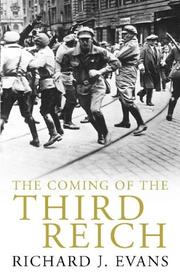
The Coming of the Third Reich
By richard j. evans.
The Coming of the Third Reich by Richard J. Evans is a gripping and comprehensive book about Hitler’s rise to power. Evans meticulously examines the political, economic, and social factors that paved the way for the Nazi regime in Germany. He delves into the historical background of the Weimar Republic, the impact of the Treaty of Versailles, and the turbulent interwar years, offering a vivid and insightful account of the events leading up to Hitler’s ascent. Through meticulous research and compelling narration, Evans brings to life the key figures, ideologies, and power struggles that shaped the book on Hitler’s rise to dictatorship. The Coming of the Third Reich is an essential read for anyone seeking a deeper understanding of this pivotal period in modern history.
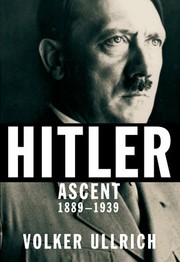
Hitler: Ascent, 1889-1939
By volker ullrich.
Hitler: Ascent, 1889-1939 by Volker Ullrich is a comprehensive and captivating book about Hitler. Ullrich delves into the early years of the infamous dictator, exploring his rise to power and the events that shaped his ideology. Through meticulous research and engaging writing, the author provides a detailed account of Hitler’s life, from his humble beginnings to his political ascent in Germany. Ullrich’s narrative is both informative and thought-provoking, offering new insights into the man behind the atrocities of the Nazi regime. This book on Hitler is a must-read for anyone interested in understanding the complexities of one of history’s most notorious figures.

The Third Reich in Power
The Third Reich in Power, written by Richard J. Evans , is a gripping book about the era of Nazi rule in Germany. This highly detailed and meticulously researched book on Hitler delves into the inner workings of the Nazi regime, providing a comprehensive overview of how Hitler and his party consolidated their power and transformed Germany into a totalitarian state. Evans explores various aspects of life under the Third Reich, including the economy, culture, and the impact of Nazi policies on different segments of society. Through vivid storytelling and insightful analysis, Evans paints a vivid picture of the complexities and horrors of Hitler’s rule, making this book about Hitler a must-read for anyone interested in understanding the history of the Third Reich.
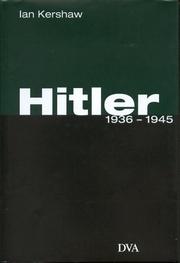
Hitler: 1936-1945: Nemesis
Hitler: 1936-1945: Nemesis, authored by Ian Kershaw, is a riveting book about the infamous dictator’s final years in power. This meticulously researched and compellingly written book on Hitler delves into the tumultuous events of 1936-1945, chronicling the dictator’s unyielding grip on Germany and his relentless pursuit of domination. Kershaw’s exploration of Hitler’s inner circle, the Nazi war machine, and the devastating impact of his decisions offers a chilling insight into the depths of human depravity and the horrors of World War II. With meticulous attention to detail and a gripping narrative, this Hitler book paints a vivid portrait of a man consumed by megalomania and a nation plunged into darkness. Hitler: 1936-1945: Nemesis is an essential read for anyone seeking to understand the complexities of this dark period in history.

Hitler: A Global Biography
By brendan simms.
Hitler: A Global Biography by Brendan Simms is a comprehensive and insightful exploration of the life and impact of the notorious dictator. This compelling book on Hitler delves into his early years, rise to power, and the global consequences of his actions. Simms offers a fresh perspective on the man behind the atrocities, examining his relationships, motivations, and the international context in which he operated. Through meticulous research and engaging prose, the author presents a nuanced and multifaceted portrait of the infamous leader. This book about Hitler is a must-read for anyone seeking a deeper understanding of one of history’s most influential and destructive figures. Simms’ work is a thought-provoking and essential contribution to the study of Hitler and the Second World War.
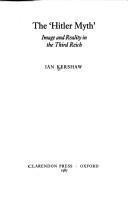
The Hitler Myth: Image and Reality in the Third Reich
The Hitler Myth: Image and Reality in the Third Reich, written by Ian Kershaw, is a captivating exploration of the construction and impact of the ‘Hitler Myth’ in Nazi Germany. This groundbreaking book delves into the manipulation of Adolf Hitler’s public image and the cult of personality that surrounded him, shedding light on the ways in which propaganda and mass media were used to elevate him to an almost god-like status in the eyes of the German people. Kershaw meticulously dissects the reality behind the myth, offering a comprehensive analysis of Hitler’s actual power and influence, as well as the devastating consequences of his reign. Through meticulous research and compelling storytelling, Kershaw provides a thought-provoking and insightful examination of one of the most notorious figures in history. This is a must-read for anyone interested in understanding the complexities of Hitler’s impact on the Third Reich.

Hitler: A Study in Tyranny
By alan bullock.
Alan Bullock’s book on Hitler, “A Study in Tyranny,” provides a comprehensive and gripping account of the rise and reign of the infamous dictator. Through meticulous research and insightful analysis, Bullock delves into Hitler’s early life, his political ambitions, and the events that led to the devastating impact of his rule. This compelling biography offers a deep understanding of the complexities of Hitler’s character and the socio-political climate that allowed his ascent to power. Bullock’s narrative skillfully captures the magnitude of Hitler’s influence and the horrors of his regime, making this book about Hitler a crucial read for anyone seeking to comprehend the darkest chapters of human history.
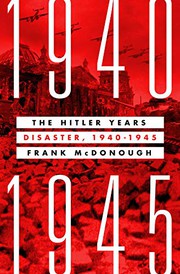
The Hitler Years: Triumph 1933-1939
By frank mcdonough.
The Hitler Years: Triumph 1933-1939, penned by Frank McDonough, is a gripping account of Adolf Hitler’s rise to power and the subsequent years of his dictatorial rule in Germany. McDonough meticulously chronicles the political maneuvering, propaganda, and repression that characterized the Nazi regime during this period. Through in-depth research and compelling storytelling, the author provides a comprehensive understanding of the societal, economic, and international factors that facilitated Hitler’s ascent to power and his consolidation of authority. McDonough’s book offers readers a fascinating insight into the complexities of Hitler’s leadership and the impact of his policies on Germany and the world. This meticulous and insightful book about Hitler is essential reading for anyone seeking to comprehend the turbulent and transformative years of Nazi Germany.
Recommended for you:

Hitler: The Path to Power
By charles bracelen flood.
Hitler: The Path to Power by Charles Bracelen Flood is a gripping exploration of the early years of the man who would become one of the most notorious figures in history. This meticulously researched book delves into Hitler’s upbringing, his experiences in World War I, and the political and social climate of post-war Germany that allowed his rise to power. Flood’s narrative is compelling and sheds light on the complex factors that shaped Hitler’s worldview and ambitions. Through vivid storytelling and insightful analysis, the author paints a vivid portrait of the man behind the dictator, offering readers a deeper understanding of the forces that propelled him towards his infamous destiny. For anyone seeking a comprehensive and engrossing book about Hitler, this is an essential read.
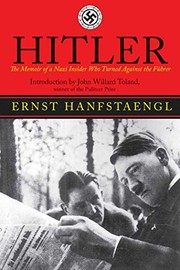

Hitler: The Memoir of the Nazi Insider Who Turned Against the Fuhrer
By ernst hanfstaengl.
Hitler: The Memoir of the Nazi Insider Who Turned Against the Fuhrer by Ernst Hanfstaengl is a gripping and insightful book on Hitler. Hanfstaengl, a close confidant of the infamous dictator, provides a unique perspective on the rise and fall of the Third Reich. Through his personal experiences and observations, readers are given a rare glimpse into the inner workings of Hitler’s regime and the man behind the atrocities. This book about Hitler delves into the psychology of power and the dangers of unchecked authority. Hanfstaengl’s transformation from a loyal supporter to a vocal opponent of Hitler adds a compelling layer to the narrative, making this a must-read for history enthusiasts and anyone seeking to understand the complexities of one of the most notorious figures in history.
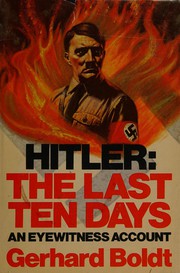
Hitler: The Last Ten Days
By gerhard boldt.
Hitler: The Last Ten Days by Gerhard Boldt offers a gripping and detailed account of the final days of the infamous leader. This book on Hitler provides a chilling insight into the chaotic and tense atmosphere within the bunker as the Third Reich crumbled around him. Boldt’s meticulous research and compelling narrative bring to life the events leading up to Hitler’s demise, shedding light on the psychological state of the dictator and the power struggles among his inner circle. The book about Hitler paints a vivid picture of the desperation and delusion that consumed the Nazi regime in its last days. Boldt’s thorough examination of this dark chapter in history makes this Hitler book a must-read for anyone seeking a deeper understanding of the man and the era he dominated.
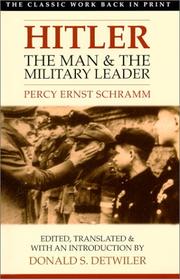
Hitler: The Man and the Military Leader
By percy ernst schramm.
Hitler: The Man and the Military Leader by Percy Ernst Schramm is a comprehensive and insightful exploration of the life and military strategies of the infamous dictator. This meticulously researched book offers a compelling analysis of Hitler’s rise to power, his leadership style, and his impact on the course of history. Schramm delves into Hitler’s personal background, his ideologies, and the pivotal decisions he made as a military leader during World War II. With a keen focus on both the man and the strategist, this book provides a multidimensional portrait of one of the most enigmatic and controversial figures in modern history. Whether you’re a history buff or simply intrigued by the complexities of human nature, this book about Hitler is a must-read for anyone seeking a deeper understanding of the man behind the dictator.
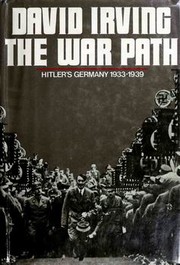
The War Path: Hitler’s Germany 1933-1939
By david irving.
The War Path: Hitler’s Germany 1933-1939 by David Irving is a comprehensive and meticulously researched account of the rise of the Nazi regime in Germany. This book delves into the political, social, and economic factors that contributed to Hitler’s ascent to power, as well as the subsequent policies and actions that led to the outbreak of World War II. Irving provides a gripping and detailed narrative that sheds light on the complexities of Hitler’s Germany, offering readers a deeper understanding of the events leading up to the war. This book about Hitler is a valuable resource for anyone seeking to gain insight into one of the most notorious periods in modern history.
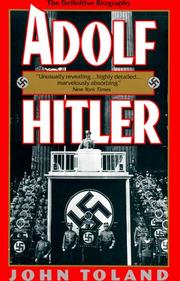
Adolf Hitler
By john toland.
John Toland’s book on Hitler offers a comprehensive and gripping account of the life of the infamous dictator. Toland delves deep into the psyche of the man behind the atrocities, exploring his rise to power, his manipulation of the masses, and the events that led to the devastation of World War II. Through meticulous research and compelling narrative, Toland paints a vivid portrait of the enigmatic figure, shedding light on the complexities of his character and the forces that shaped his ideology. This book about Hitler is a haunting and thought-provoking examination of one of the most notorious figures in history, offering valuable insights into the darkest chapters of the 20th century. Toland’s hitler book is a must-read for those seeking a deeper understanding of the man and the era that he defined.
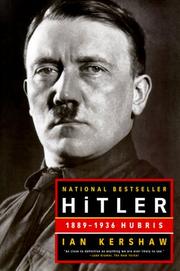
Hitler: 1889-1936: Hubris
Hitler: 1889-1936: Hubris by Ian Kershaw is a compelling book about Hitler that delves into the rise of the notorious dictator. Kershaw provides a detailed account of Hitler’s early years, from his humble beginnings to his emergence as a charismatic and ruthless leader. The book explores Hitler’s transformation from a struggling artist to a powerful political figure, shedding light on the events and circumstances that shaped his ideology and ambitions. Kershaw’s meticulous research and insightful analysis offer readers a thought-provoking exploration of the factors that contributed to Hitler’s ascent to power, making this a must-read for anyone interested in understanding the complexities of Hitler’s character and the forces that propelled him to infamy.
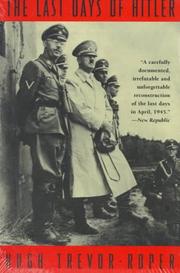
The Last Days of Hitler
By hugh trevor-roper.
The Last Days of Hitler by Hugh Trevor-Roper is a gripping and meticulously researched account of the final days of the notorious dictator. Trevor-Roper, a renowned historian, offers a compelling narrative that delves into the chaotic and dramatic events leading up to Hitler’s demise. Through his extensive research and interviews with key witnesses, Trevor-Roper provides a detailed and chilling portrayal of the Nazi leader’s last moments in his Berlin bunker. This book on Hitler paints a vivid picture of the paranoia, desperation, and delusion that consumed him as the war drew to a close. The Last Days of Hitler is a must-read for anyone interested in the history of the Second World War and the enigmatic figure at its center. It is an essential book about Hitler that sheds light on the final chapter of his tyrannical reign.
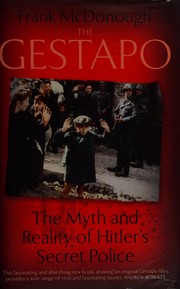
The Gestapo: The Myth and Reality of Hitler’s Secret Police
The Gestapo: The Myth and Reality of Hitler’s Secret Police by Frank McDonough is a comprehensive and gripping exploration of the infamous secret police force of Nazi Germany. McDonough delves into the origins, operations, and impact of the Gestapo, dispelling myths and revealing the harsh realities of its reign of terror. Through meticulous research and compelling storytelling, he paints a vivid picture of the Gestapo’s role in enforcing the Nazi regime’s brutal policies and persecuting its enemies. This book on Hitler’s secret police is an essential read for anyone seeking to understand the terrifying machinery of oppression that operated under Hitler’s rule. McDonough’s expert analysis offers a chilling glimpse into a dark chapter of history, shedding light on the inner workings of the Gestapo and its devastating impact on the lives of countless individuals.

by Adolf Hitler
Mein Kampf, a notorious book written by Adolf Hitler, provides a chilling insight into the mind of the man who would become one of the most reviled figures in history. This autobiography and political manifesto, which translates to “My Struggle” in English, outlines Hitler’s racist ideology, anti-Semitism, and his plans for Germany’s future. The book delves into his early life, political beliefs, and his ambitions for the German nation. Mein Kampf is a controversial and disturbing glimpse into the thoughts of a man whose name has become synonymous with evil. It is a must-read for anyone seeking to understand the origins of the Nazi regime and the atrocities committed during World War II.
So there you have it, the 20 best books about Hitler . From in-depth biographies to historical analyses, these books offer a comprehensive look at one of the most significant figures in modern history. Whether you’re a history buff or simply curious about the man behind the atrocities, these books provide valuable insight into the life and impact of Adolf Hitler.
Which Hitler book is best?
The best book on Hitler can vary with personal preference, but three widely recommended titles are:
- The Rise and Fall of the Third Reich by William L. Shirer ,
- Hitler: A Biography by Ian Kershaw ,
- The Coming of the Third Reich by Richard J. Evans .
Each offers valuable insights and could be a great starting point.
What are the best books to learn about Hitler?
For those looking to learn about Hitler, there is a wealth of literature that can provide a comprehensive understanding of the subject. Some of the most highly recommended books include:
- The Coming of the Third Reich by Richard J. Evans ,
- Hitler: Ascent, 1889-1939 by Volker Ullrich ,
- The Third Reich in Power by Richard J. Evans ,
- Hitler: 1936-1945: Nemesis by Ian Kershaw ,
- Hitler: A Global Biography by Brendan Simms ,
- The Hitler Myth: Image and Reality in the Third Reich by Ian Kershaw ,
- Hitler: A Study in Tyranny by Alan Bullock ,
- The Hitler Years: Triumph 1933-1939 by Frank McDonough
These books offer a range of perspectives on Hitler, covering various aspects and approaches to the subject.
What are the best books on Hitler?
The best books on Hitler include:
- Hitler: The Path to Power by Charles Bracelen Flood ,
- Hitler: The Memoir of the Nazi Insider Who Turned Against the Fuhrer by Ernst Hanfstaengl ,
- Hitler: 1936-1945: Nemesis by Ian Kershaw .
Each offers unique insights into the subject. While these books on the topic of Hitler are highly regarded, it’s important to note that any list of ‘best’ books is subjective and reflects a range of opinions.
What are the best Hitler books of all time?
Choosing the best Hitler books of all time can vary depending on who you ask, but seven titles that are often celebrated include
- The Hitler Years: Triumph 1933-1939 by Frank McDonough ,
- and Hitler: The Path to Power by Charles Bracelen Flood .
Each of these books has made a significant impact in the field of Hitler and continues to be influential today.
Related posts:
Hitler by Volker Ullrich

Readers might believe there is no need for another book on Adolf Hitler. After all, there have been tens of thousands over the last 60-plus years. Yet German historian Volker Ullrich’s two-volume biography—the first, published in English in 2016, on Hitler’s rise, and the second, new this year, on the denouement of his reign—is a testament to what a great historian can do with original research and brilliant synthesis on even the most-trodden terrain. This second volume, translated to English by Jefferson Chase, explains how the seeds of Hitler’s downfall sprung from the very same qualities (obsession, fanaticism, deceit, refusal to listen to others) that helped him rise to power.
Buy Now: Hitler on Bookshop | Amazon
Your browser is out of date. Please update your browser at http://update.microsoft.com
Axis History Forum
This is an apolitical forum for discussions on the Axis nations and related topics hosted by the Axis History Factbook in cooperation with Christian Ankerstjerne’s Panzerworld and Christoph Awender's WW2 day by day . Founded in 1999.
Skip to content
- Support Axis History Forum
- Help and Guide
- Board index Research Help Books & other Reference Material
Best Hitler Biography?
Post by fletchemall » 08 Dec 2011 04:29
Re: Best Hitler Biography?
Post by J. Duncan » 08 Dec 2011 08:26
Post by fletchemall » 08 Dec 2011 08:54
Post by vszulc » 08 Dec 2011 08:54
Post by fletchemall » 08 Dec 2011 09:01
Post by J. Duncan » 08 Dec 2011 20:45
Post by MLW » 09 Dec 2011 01:40
Post by fletchemall » 09 Dec 2011 02:11
Post by Dan W. » 09 Dec 2011 05:06
Post by fletchemall » 09 Dec 2011 09:40
Dan W. wrote: The two volume biography by Toland is superb. You absolutely cannot go wrong by reading it.
Post by J. Duncan » 09 Dec 2011 15:24
Post by fletchemall » 10 Dec 2011 09:51
Post by J. Duncan » 10 Dec 2011 13:44
Post by coburg22 » 10 Dec 2011 15:30
Post by J. Duncan » 10 Dec 2011 20:43
Return to “Books & other Reference Material”
- Axis History
- ↳ Life in the Third Reich & Weimar Republic
- ↳ Propaganda, Culture & Architecture
- ↳ Music of the Reich
- ↳ Women in the Reich
- ↳ Heer, Waffen-SS & Fallschirmjäger
- ↳ Model building
- ↳ U-Boats
- ↳ Kriegsmarine surface ships and Kriegsmarine in general
- ↳ Luftwaffe air units and Luftwaffe in general
- ↳ Legion Condor
- ↳ German Strategy & General German Military Discussion
- ↳ NSDAP, other party organizations & Government
- ↳ The Phil Nix SS & Polizei section
- ↳ The Dieter Zinke Axis Biographical Research Section
- ↳ Japan at War 1895-1945
- ↳ Italy under Fascism 1922-1945
- ↳ Minor Axis Nations
- ↳ Finland
- ↳ Foreign Volunteers & Collaboration
- ↳ Holocaust & 20th Century War Crimes
- Axis Equipment
- ↳ Aircraft
- ↳ Fortifications, Artillery, & Rockets
- ↳ The Ron Klages Panzer & other vehicles Section
- ↳ Panzer & other vehicles - Photo threads
- ↳ Small Arms
- ↳ Other Equipment
- Militaria & Collecting
- ↳ Axis Awards
- ↳ Militaria for sale
- ↳ Axis Documents, Feldpost numbers, Postcards & Other Paper Items
- ↳ Axis Uniforms, Headgear & Insignia
- ↳ Other WW1 & WW2 Militaria
- ↳ For Sale & Wanted
- ↳ Reproductions Sales
- The Allies & the Neutral States
- ↳ China at War 1895-1949
- ↳ France 1919-1945
- ↳ Poland 1919-1945
- ↳ The Soviet Union at War 1917-1945
- ↳ The United Kingdom & its Empire and Commonwealth 1919-45
- ↳ USA 1919-1945
- ↳ The Allies and the Neutral States in general
- World War II and Inter-War Era
- ↳ WW2 in Africa & the Mediterranean
- ↳ WW2 in Eastern Europe
- ↳ WW2 in Western Europe & the Atlantic
- ↳ WW2 in the Pacific & Asia
- ↳ Winter War & Continuation War
- ↳ Spanish Civil War & Legion Condor
- ↳ Economy
- ↳ First World War
- ↳ Imperial Germany
- ↳ German Colonies and Overseas Expeditions
- ↳ Austria-Hungary 1867–1918
- ↳ The end of the Ottoman Empire 1908-1923
- ↳ Other eras
- Research Help
- ↳ Translation help: Breaking the Sound Barrier
- ↳ Books & other Reference Material
- ↳ Archives
- Other areas
- ↳ Movies, games & other fiction
- ↳ What if
- ↳ Reenactment
- Board index
- All times are UTC
Reading the Best Biographies of All Time

Review of “Hitler: A Biography” by Ian Kershaw
01 Thursday Sep 2022
Posted by Steve in Leaders / Politicians
≈ 12 Comments
Adolf Hitler , Alan Bullock , biographies , book reviews , Ian Kershaw , Joachim Fest , John Toland , Nazi Germany , Volker Ullrich

“ Hitler: A Biography ” is Ian Kershaw’s 2008 abridgment of his masterful two-volume series on Adolf Hitler. Kershaw is a British historian focused on 20th-century Germany and is a noted expert on Adolf Hitler and Nazi Germany.
The volumes underlying this abridgment (“ Hitler: 1889-1936 Hubris ” and “ Hitler: 1936-1945 Nemesis “) were published in 1998 and 2000, respectively. The series was originally conceived as a study of power – much like Robert Caro’s series on Lyndon B. Johnson – but grew into something even deeper and more substantial than expected. Kershaw was convinced to condense the series in order to make it accessible to a wider group of readers.
Adolf Hitler (1889-1945) is one of history’s most horrifying and unfathomable demons. Not surprisingly, there are a large number of excellent books focused on his life and legacy including well-known biographies by Alan Bullock , Joachim Fest , John Toland and Volker Ullrich , among others.
Readers seeking an uplifting and entertaining biography would do well to steer clear of Hitler, of course. But anyone willing to embrace a serious and somber subject will find that Kershaw’s abridged biography of Hitler is extraordinarily thoughtful, methodical and penetrating.
Much of the 969-page narrative is devoted to considering Hitler’s personality, psychological make-up and his rhetorical and political talents. As Kershaw adeptly observes, these catalysts – along with a unique combination of timing, chance and circumstance – converged in such a way that Hitler and his perverted world view could take root and flourish.
The book’s focus on Hitler’s persona – which also considers his childhood influences, early professional failures and the broader context of post-WWI Germany – is arguably the most interesting and insightful part of the book. But the remainder of the narrative – which systematically documents the disintegration of the old German Republic and the rise of Hitler’s monstrous variant of fascism – is undeniably meritorious.
In many ways, this is really a political biography of both Hitler and the Nazi Party. As such, it is careful to consider the broad social, cultural, economic and political contexts which contributed to Hitler’s rise. Readers unfamiliar with mid-twentieth century history or World War II’s broad thrusts, however, may find Kershaw’s field-of-view too tightly focused on central Europe to provide much insight into the “big picture.”
The narrative is consistently serious, analytical and reflective. It is also frequently dry and fact-heavy. Kershaw’s riveting dissection of Hitler’s persona eventually transitions to an exhaustive chronicle of events which fans of the era will find intellectually invigorating. But some readers are likely to find large sections of the biography tedious or superfluous.
In addition, it may surprise some readers that such a detailed biography of Germany’s idiopathic villain almost entirely fails to involve figures like Winston Churchill, FDR and Dwight Eisenhower. However, notorious henchmen such as Hermann Göring, Joseph Goebbels and Rudolf Hess (among many others) are prominently featured, along with other key adversaries and allies such as Benito Mussolini and Josef Stalin.
Overall, Ian Kershaw’s “ Hitler: A Biography ” is nearly everything one could expect from a serious survey of Hitler’s life: it is magisterial and sweeping, serious, thorough, analytical and extraordinarily thoughtful. Only readers with an inclination toward more buoyant topics, or a lighthearted and mellifluous narrative, will find much lacking in this biography.
Overall rating: 4¼ stars
12 thoughts on “Review of “Hitler: A Biography” by Ian Kershaw”
September 1, 2022 at 2:37 pm
I’ve only read one complete biography on Hitler, and it was John Toland’s I would recommend it also. This bio doesn’t bog down at all. Not only covers all aspects of Hitler’s life, but does a good job of describing of what made Hitler.
September 1, 2022 at 3:46 pm
Nice review as usual. I’ve read the full two-volumes of Kershaw’s bio but it doesn’t sound like the abridgement lost much of substance. He has a very good handle not only on Hitler but also the broader concept of the Fuhrerprinzip and how Nazism actually functioned as a system of government. Some other writers (Richard Evans I think) have criticized him for being too narrowly focused on Hitler’s perspective, but that’s probably inevitable in a biography.
September 2, 2022 at 4:37 am
I was fascinated to read Kershaw’s explanation for writing the single-volume condensed version of the series and the struggle he faced trying to abbreviate something he felt was already the perfect length 🙂
Although his narrative is certainly quite focused on Hitler’s sphere, I suppose it’s hard to fault. This book isn’t likely to have many readers who cannot fill in the bigger picture – even though adding that even broader context intermittently would have made this a better, more approachable book for a larger potential audience.
September 1, 2022 at 4:01 pm
For Steve, from Volker Ulrich’s introduction to Hitler, which I hope will help him in his subsequent journey:
“Parallel to but largely independent of the entertainment market, academic historians around the world have pressed forward with investigations concerning nearly every aspect of Hitler and National Socialism. No historical topic has been more thoroughly researched in all its nooks and crannies—today the literature on the subject fills whole libraries. And yet academic interest in this “murky figure” never wanes. The riddles surrounding Hitler —the questions of how and why he could come to power and hang on to it for more than a decade—demand ever-new explanations. There has been no shortage of biographical approaches to these questions, but only four have stood the test of time: Konrad Heiden’s two-volume Hitler: A Biography, written in the mid-1930s from Swiss exile; Alan Bullock’s canonical Hitler: A Study in Tyranny from the early 1950s; Joachim Fest’s sweeping portrait Hitler: A Biography, first published in 1973; and Ian Kershaw’s standard-setting Hitler 1889–1936: Hubris and Hitler 1936–1945: Nemesis from 1998 and 2000.4
September 2, 2022 at 4:38 am
Thanks for this! I always love reading pithy thoughts about competing biographies from people who, although possibly biased, are in a position to have keen insight.
September 1, 2022 at 5:38 pm
Kershaw’s To Hell and Back was a rough read for me (though that may be due to its breadth), so I did not have his Hitler bio on my list. Good to see you liked this overall, though your dry and fact heavy comment reminds me of why I did not like To Hell and Back. I have also been considering whether to read Evans’ Third Reich Trilogy which gets a lot of positive reviews.
September 1, 2022 at 9:30 pm
Evans’ books fully deserve their reputation. Especially the second volume (The Third Reich in Power) which gets into the fine grain detail of what it was like to live in Hitler’s Germany.
September 1, 2022 at 10:22 pm
Thanks. I think I will read them.
September 2, 2022 at 3:52 pm
I have been using your bibliography of American presidents with abandon. I usually order used copies of hard cover ones since they are too unwieldy to read in paper. I am so grateful for the depth of your reviews. I am looking forward to volume 2 on JFK and note that the author is on leave, hopefully to finish it. Logevall is such a good writer that I went ahead and read his volume on the French involvement in Viet Nam as it transferred to be our problem. I will pass on Hitler, but appreciate your clear review.
September 3, 2022 at 4:53 am
It’s funny, but I have found myself strongly tending towards hardbacks as well. Easier to travel with, easier to keep open without laying another book on the edge of the pages I’ve read while I read and type notes, …..
I am looking forward to Logevall’s 2nd volume (and have been for quite some time). I’ve not yet read volume 1 though it’s staring at me from a bookshelf. But having skimmed it, I’m really looking forward to the series once it is complete!
September 3, 2022 at 2:25 pm
I devoured Volume 1 and was particularly captured by his clear prose. Hence my following up with his other books.
December 4, 2022 at 12:40 pm
I have found that some of the biographies are so big that they are difficult to hold and in those cases I look for an e-version from my library.
Leave a comment Cancel reply

- Already have a WordPress.com account? Log in now.
- Subscribe Subscribed
- Copy shortlink
- Report this content
- View post in Reader
- Manage subscriptions
- Collapse this bar

COMMENTS
Hitler has a reputation as the incarnation of evil. But, as British historian Michael Burleigh points out in selecting the best books on the German dictator, Hitler was a bizarre and strangely empty character who never did a proper day's work in his life, as well as a raving fantasist on to whom Germans were able to project their longings.
24 books based on 23 votes: Hitler by Ian Kershaw, Hitler by Joachim Fest, Adolf Hitler by John Toland, Hitler: The Terminal Biography by D. Harlan Wilso...
The best book on Hitler can vary with personal preference, but three widely recommended titles are: The Rise and Fall of the Third Reich by William L. Shirer, Hitler: A Biography by Ian Kershaw, The Coming of the Third Reich by Richard J. Evans. Each offers valuable insights and could be a great starting point.
I am Professor of Modern European History at the University of Southampton, UK, and publish widely on diverse aspects of Nazi Germany. The first history book that I ever read was Alan Bullock's Hitler. A Study in Tyranny - the first scholarly biography of Hitler to appear. I still recall the fascination of reading this as a teenager: it sparked a curiosity that formed the basis of a ...
Yet German historian Volker Ullrich's two-volume biography—the first, published in English in 2016, on Hitler's rise, and the second, new this year, on the denouement of his reign—is a ...
If your interest is simply to read a single, good biography of Hitler and be done with him, I would suggest you read John Toland's biography (the full bio., not the abridgement!). ... "Hitler in Vienna" by Brigitte Hamann (best book on Hitler's youth and formation of his "world view") e. "Hitler: The Psychopathic God" by Robert G. L. Waite ...
I greatly admire how this book subverts the traditional form of biography in a way that perfectly suits the subject. Mildred Harnack, the author's great-great-aunt, was an astoundingly brave young woman from Wisconsin who, starting in the early 1930s, had a central role in Berlin's homegrown opposition to the Nazis and was eventually beheaded on orders from Hitler.
He is best known for his biography of Adolf Hitler.[1] Toland tried to write history as a straightforward narrative, with minimal analysis or judgment. This method may have stemmed from his original goal of becoming a playwright. ... The Book Adolf Hitler by John Toland is a biography on Adolf Hitler's life. The book started when Hitler was ...
Hitler: A Biography by Ian Kershaw 1,072 pages W. W. Norton Published: Nov 2008 "Hitler: A Biography" is Ian Kershaw's 2008 abridgment of his masterful two-volume series on Adolf Hitler. Kershaw is a British historian focused on 20th-century Germany and is a noted expert on Adolf Hitler and Nazi Germany. The volumes underlying this abridgment…
William Shirer's The Rise and Fall of the Third Reich isn't exclusively a biography of Hitler, but it gives an accurate and detailed account of Hitler's youth in the course of describing the history of the Third Reich. Use caution when evaluating Shirer's opinions about German national character, but you can rely on him for the facts of Hitler's youth.